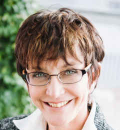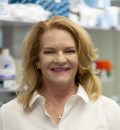Keynote Speakers
 Brenda Andrews, PhD
Brenda Andrews, PhD
University of Toronto
Dr. Andrews' lab is interested in understanding cellular signalling processes in budding yeast using functional genomics tools.
First, they use synthetic genetic array (SGA) technology combined with a variety of libraries of yeast strains to genetically screen for interactions of enzymes (e.g. protein kinases, lysine deacetylases) and their targets. Her group has created a variety of resources and collections for the community with application to the SGA platform, including a selection of overexpression arrays.
Second, they have combined SGA with high content screening (HCS) to assess changes in protein localization and abundance under a variety of genetic, environmental and chemical stresses using rapid image acquisition and analysis. SGA-HCS is also used to detect mutants that show defects in their sub-cellular morphology, such as reduced formation of DNA damage foci.
Third, her lab has pioneered the use of SGA for genome wide analysis of reporter gene-expression, particularly for studying transcriptional changes throughout the cell cycle. We are also interested in understanding cell cycle processes and molecular players that regulate endocytosis via directed mechanistic studies.
Finally, in collaboration with Dr. Charlie Boone, they are also trying to understand genetic redundancy and natural variation in yeast strains.
 Ziv Bar-Joseph, PhD
Ziv Bar-Joseph, PhD
Carnegie Mellon University
Dr. Bar-Joseph is the FORE Systems Professor of Computer Science at the Machine Learning Department and the Computational Biology Department which are part of the School of Computer Science at Carnegie Mellon University. He is the recipient of the 2012 Overton Prize in computational biology.
His primary research areas are computational Biology, Bioinformatics and Machine learning. He is heading the Systems Biology Group at the School of Computer Science at CMU. His group develops computational methods for understanding the interactions, dynamics and conservation of complex biological systems. His work addresses issues ranging from the experimental design level to the systems biology level. He is also interested in how shared principles between computation and biology can be used to improve our understanding of both fields. His group is looking at algorithms used by nature to see if we can obtain new ideas on how to design better algorithms for distributed computing systems while at the same time infer new insights regarding information processing in biology.
 Su-In Lee, PhD
Su-In Lee, PhD
University of Washington
Prof. Su-In Lee is an Associate Professor in the Paul G. Allen School of Computer Science & Engineering. She completed her PhD in 2009 at Stanford University with Prof. Daphne Koller in the Stanford Artificial Intelligence Laboratory in Computer Science. Before joining the UW in 2010, Lee was a visiting Assistant Professor in the Computational Biology Department at Carnegie Mellon University School of Computer Science. She has received the National Science Foundation CAREER Award and been named an American Cancer Society Research Scholar. She has received numerous generous grants from the National Institutes of Health (NIH), the National Science Foundation (NSF), and the American Cancer Society.
 Dina Machuve, PhD
Dina Machuve, PhD
Nelson Mandela African Institution of Science and Technology
Dina Machuve is a Lecturer at the Nelson Mandela African Institution of Science and Technology (NM-AIST) in Arusha, Tanzania. Her research focuses on developing data-driven solutions in Agriculture. For her PhD dissertation she investigated the information logistics of small and medium size food processors. Currently, she is looking at developing a poultry diseases diagnostics tool using deep learning for small and medium scale poultry farmers in Tanzania. She is an Early Career Fellow of the Organization for Women in Science for the Developing World (OWSD). She serves in the organizing committee of Data Science Africa (DSA), an organization that runs an annual data science and machine learning summer school and workshop in Africa. She is also a member of a research group on Mechanism Design for Social Good (MD4SG). She completed her PhD in Information and Communication Science and Engineering from NM-AIST in 2016. She also has an MS in Electrical Engineering and BSc in Electrical Engineering.
 Elaine Mardis, PhD
Elaine Mardis, PhD
Nationwide Children's Hospital
Co-Executive Director of the Institute for Genomic Medicine at Nationwide Children’s Hospital and the Nationwide Foundation Endowed Chair of Genomic Medicine. She also is Professor of Pediatrics at The Ohio State University College of Medicine. Dr. Mardis joined Nationwide Children’s Hospital in 2016.
Educated at the University of Oklahoma with a B.S. in Zoology and a Ph.D. in Chemistry and Biochemistry, Dr. Mardis did postgraduate work in industry at BioRad Laboratories. She was a member of the faculty of Washington University School of Medicine from 1993-2016.
Dr. Mardis has authored over 350 articles in prestigious peer-reviewed journals and has written book chapters for several medical textbooks. She serves as an associate editor for three peer-reviewed journals (Disease Models and Mechanisms, Molecular Cancer Research, and Annals of Oncology) and is Editor-in-Chief of Molecular Case Studies, published by Cold Spring Harbor Press. Dr. Mardis has given lectures at scientific meetings worldwide and was awarded the Morton K Schwartz award from the American Association for Clinical Chemistry in 2016. She has been listed since 2013 as one of the most highly cited researchers in the world by Thompson Reuters. Dr. Mardis has been a member of the American Association for Cancer Research (AACR) since 2007, was the program committee chair for the 2018 AACR Annual Meeting and is the current AACR President. She was elected a Fellow of the AACR Academy, and also was elected to membership in the National Academy of Medicine in 2019.
 Rada Mihalcea, PhD
Rada Mihalcea, PhD
University of Michigan
Rada Mihalcea is a Professor of Computer Science and Engineering at the University of Michigan and the Director of the Michigan Artificial Intelligence Lab. Her research interests are in computational linguistics, with a focus on lexical semantics, multilingual natural language processing, and computational social sciences. She serves or has served on the editorial boards of the Journals of Computational Linguistics, Language Resources and Evaluations, Natural Language Engineering, Journal of Artificial Intelligence Research, IEEE Transactions on Affective Computing, and Transactions of the Association for Computational Linguistics. She was a program co-chair for EMNLP 2009 and ACL 2011, and a general chair for NAACL 2015 and *SEM 2019. She currently serves as ACL Vice-President. She is the recipient of a Presidential Early Career Award for Scientists and Engineers awarded by President Obama (2009) and an ACM Fellow (2019). In 2013, she was made an honorary citizen of her hometown of Cluj-Napoca, Romania.
 Sara Mostafavi, PhD
Sara Mostafavi, PhD
Stanford University
Sara Mostafavi is an Associate Professor in the Paul G. Allen School of Computer Science & Engineering at University of Washington (UW). Before UW, between 2015 and August 2020, Sara was an Assistant Professor at the Department of Statistics and the Department of Medical Genetics at University of British Columbia (UBC), and a faculty member at the Vector Institute. Sara is a recipient of Canadian Institute of Advanced Research (CIFAR) AI Chair (2018), and a Canada Research Chair in Computational Biology (2015-2020). She obtained a PhD in Computer Science from the University of Toronto in 2011, and performed her postdoctoral work at Stanford University. Sara's research develops and applies machine learning and statistical methods for understanding the relationship between genome, biological function, and disease.
 Harinder Singh, PhD
Harinder Singh, PhD
University of Pittsburgh
Dr. Singh's interests are focused on the analysis of transcription factors and gene regulatory networks (GRNs) that orchestrate the development and functioning of innate as well as adaptive cells of the immune system. As an HHMI Investigator at the University of Chicago, his lab discovered that the Ets family member PU.1 was required for the development of multiple innate and adaptive immune cell lineages. They have systematically illuminated the molecular functions of PU.1 in the development of B cells and macrophages. In a collaboration, they cloned IRF4, a PU.1 partner. IRF4 regulates plasma cell differentiation and its molecular actions are antagonized by the related protein IRF8 to promote the germinal center B cell fate. IRF4 and IRF8 are immune-system specific members of the IRF family of transcriptions factors that have crucial and diverse functions in regulating B and T lymphocytes as well as macrophages and dendritic cells. They have elucidated key activities of IRF4 in the genomic programming of Th17 cells as well as dendritic cells. A notable structural finding has been the discovery of distinct types of composite regulatory elements in immune response genes that are cooperatively bound by IRF4 or IRF8 with the Ets family member PU.1 or the AP-1 member BATF. Using structural and functional genomics as well as computational modeling, they are analyzing coherent networks of transcription factors and the large sets of genomic regulatory sequences through which they act. This is enabling them to assemble GRNs underlying B and macrophage cell fate specification, pre-B and plasma cell differentiation, and the programming of dendritic as well as CD4 T cell responses. They are interested in utilizing the knowledge of GRNs to engineer immune cells with new effector or regulatory capabilities that can be therapeutically harnessed.




